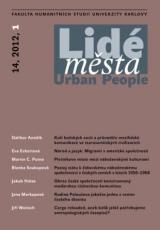Nation and Tongue
Migrants in American Society
DOI:
https://doi.org/10.14712/12128112.3523Keywords:
nation, immigration, identity, language policy, assimilation, communityAbstract
The paper debates the issues of immigration, national identity and language. It considers the goals, means and the role of language as tied to the construction of nation by Noam Webster in the United States, Josef Jungmann in Bohemia and other scholars. It examines the ideology of community unified by a shared language and other factors in the historical context of mass immigration to the U.S., the history of U.S. expansion, immigration policies and social attitudes. It contrasts two options of immigrant interaction with the receiving society, i.e., the assimilationist behaviour of German immigrants in Texas with the Czech immigrants’ efforts of building a nation in the new Texas homeland in the 19th century. In its conclusion, the article examines the vitality of the concepts of nation, community and multiculturalism.
Downloads
Published
How to Cite
Issue
Section
License

This work is licensed under a Creative Commons Attribution-NonCommercial-NoDerivatives 4.0 International License.


